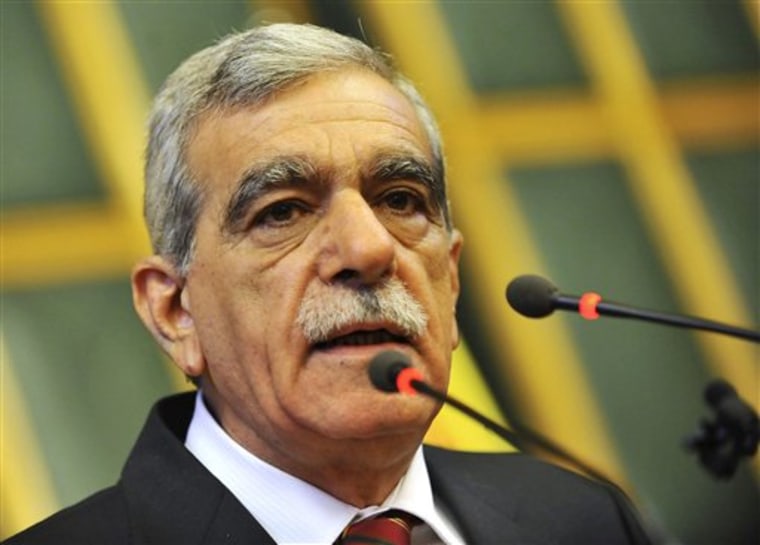Openly defying the law, a Kurdish politician spoke to lawmakers in Turkey's parliament in the Kurdish language on Tuesday to celebrate UNESCO world languages week. State-run television immediately cut off the live broadcast.
While members of his party gave Ahmet Turk a standing ovation for the politically daring move, other lawmakers were upset.
"The official language is Turkish," said Parliament Speaker Koksal Toptan. "This is written in the Constitution and laws. This meeting should have been conducted in Turkish."
Local elections
Turk's speech in Kurdish was likely to increase tensions ahead of local elections on March 29. It also could be used by a prosecutor as evidence to shut down Turk's Democratic Society Party on charges of having ties to Kurdish rebels.
Turkey's Constitution, laws regulating political parties and parliamentary bylaws all ban the speaking of Kurdish in schools, parliament and other official settings.
The party leader spoke Turkish for several minutes before switching. He said he was speaking Kurdish in recognition of U.N. cultural body UNESCO's International Mother Language Day this week to promote linguistic and cultural diversity and multilingualism.
State-run television, TRT, immediately stopped its live broadcast when Turk switched to Kurdish and private NTV television reported that the prosecutor's office quickly launched a probe.
"Turkey must save itself from the shame of banning a tongue in this era," Turk said in Turkish earlier. "Everyone should understand that requesting an end to the ban on Kurdish is an extremely natural request."
Party faces closure
Turk's party, which has 21 legislators in parliament, faces closure by the Constitutional Court for its alleged ties to the outlawed Kurdistan Workers' Party. The party runs much of Turkey's Kurdish-dominated southeast and is in fierce competition with Prime Minister Recep Tayyip Erdogan's ruling Islamic-rooted party.
Still, lawmaker Rustem Zeydan, a member of Erdogan's party from the prominently Kurdish province of Hakkari, welcomed Turk's action.
"It's an important and right step toward societal peace," he said.
Speaking Kurdish in public was entirely forbidden until 1990. Turkey continued to ban the use of the language in schools, official settings and broadcasts other than music until 2002, when — under pressure from the European Union — it allowed Kurdish-language broadcasts.
It still refuses to allow Kurdish education in schools and official settings, such as in Parliament, arguing that it would divide the country along ethnic lines.
In 1991, Kurdish lawmaker Leyla Zana took the oath in parliament in the Kurdish language, causing an uproar. She was later stripped of her immunity, prosecuted on charges of separatism and links to the rebels and served a decade in prison along with three other Kurdish legislators.
Turk is unlikely to face a prison term, but legal analysts say his action could strengthen the prosecutor's case to disband his party.
Split verdict
Reaction to Turk's move split along ethnic lines.
Yigit, a student in Ankara, who would not give his last name fearing reprisals from Kurds, objected to the speech in Kurdish.
"If you are a citizen of Turkey, you have to speak Turkish," he said. "I cannot accept this action. Such attempts should be punished. "
Residents of Diyarbakir, the largest city in Turkey's mainly Kurdish southeast, were supportive.
"It was a courageous step," said Halil Bayram, a technician. "However, I also think it was a political move before the elections. I am not happy that politicians are escalating tensions before the elections."
Shopkeeper Hasim Uyanik said Turk should not be sanctioned.
"Perhaps it was not legal, but I hope he won't be punished," he said. "Such steps toward legitimizing Kurdish must be encouraged."
Multiple calls to UNESCO in Paris went unanswered Tuesday.
